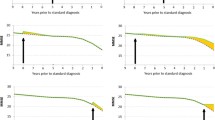Abstract
Background
In patients with moderately severe to severe Alzheimer’s disease, the N-methyl-D-aspartate (NMDA) antagonist memantine has been shown to improve outcomes and to be associated with reductions in resource utilisation and total healthcare costs relative to no pharmacological intervention after 28 weeks in phase III clinical and pharmacoeconomic studies. However, the longer term cost implications of treatment with memantine are not known.
Objective
To evaluate the effect of treatment with memantine in patients with moderately severe to severe Alzheimer’s disease on resource use and on cost and patient outcomes in Finland over a 5-year time horizon.
Methods
A Markov model was constructed to simulate a patient’s progression through a finite series of health states with a time horizon of 5 years. The states were defined in terms of physical dependency, place of residency (community or institution), and cognitive function. Each 6-month Markov cycle was repeated ten times. A 5% rate was used to discount costs. Inputs for the model were derived from epidemiological data collected during the Kuopio 75+ Study, a Finnish population-based health survey of dementia and functional capacity among individuals aged ≥75 years. Costs were considered from a societal perspective. Probabilities used in the model, together with cost and resource use differences between treatment with memantine (Ebixa®, Namenda®, Axura®) and no pharmacological intervention, were derived from a randomised, double-blind, placebo-controlled clinical trial that included an economic assessment. This study enrolled 252 patients with moderately severe to severe Alzheimer’s disease. We took a conservative approach that assumed that the effectiveness of treatment with memantine was limited to 12 months’ duration. Monte Carlo simulations were performed to evaluate the effect of treatment with memantine on duration of independence and time to institutionalisation. Sensitivity analyses included memantine efficacy best- (5 years) and worst- (6 months) case scenarios, and an analysis in which 5% discounting was not applied.
Results
Memantine therapy was associated with approximately 4 extra months of independence, 1 additional month of residence in the community, and a cost reduction relative to placebo of approximately €1700 per patient over 5 years, despite the limiting of persistence of efficacy to 12 months (year of costing, 2001). Monte Carlo simulations and sensitivity analyses supported the findings. Conclusion: According to the model, over 5 years the additional drug costs of treating patients with moderately severe to severe Alzheimer’s disease with memantine were amply offset by cost savings related chiefly to increased independence and delayed institutionalisation.











Similar content being viewed by others
Notes
The use of trade names is for product identification purposes only and does not imply endorsement.
References
Realistic expectations: The management of severe AD. Alzheimer Dis Assoc Disord 2003; 17 Suppl. 3 July/September: S80-5
Janus C. Vaccines for Alzheimer’s disease: how close are we? CNS Drugs 2003; 17(7): 457–74
Henderson AS, Jorm AF. Definition and epidemiology of dementia: a review. In: Maj M, Sartorius N, editors. Dementia. 2nd ed. Chichester: John Wiley, 2002: 1–33
Reisberg B, Burns A, Brodaty H, et al. Diagnosis of Alzheimer’s disease: report of an International Psychogeriatric Association Special Meeting Work Group under the cosponsorship of Alzheimer’s Disease International, the European Federation of Neurological Societies, the World Health Organization, and the World Psychiatric Association. Int Psychogeriatr 1997; 9 Suppl. 1: 11–38
Mayeux R, Sano M. Treatment of Alzheimer’s disease. N Engl J Med 1999; 341(22): 1670–9
Migliaccio-Walle K, Getsios D, Caro JJ, et al. Economic evaluation of galantamine in the treatment of mild to moderate Alzheimer’s disease in the United States. Clin Ther 2003; 25(6): 1806–25
Tariot PN. Medical management of advanced dementia. J Am Geriatr Soc 2003; 51(5 Suppl. ): S305–13
Fillit HM. The pharmacoeconomics of Alzheimer’s disease. Am J Manag Care 2000; 6(22 Suppl. ): S1139–44
Martin BC, Ricci JF, Kotzan JA, et al. The net cost of Alzheimer disease and related dementia: a population-based study of Georgia Medicaid recipients. Alzheimer Dis Assoc Disord 2000; 14(3): 151–9
Ernst RL, Hay JW, Fenn C, et al. Cognitive function and the costs of Alzheimer disease: an exploratory study. Arch Neurol 1997; 54(6): 687–93
Hux MJ, O’Brien BJ, Iskedjian M, et al. Relation between severity of Alzheimer’s disease and costs of caring. CMAJ 1998; 159(5): 457–65
Trabucchi M. An economic perspective on Alzheimer’s disease. J Geriatr Psychiatry Neurol 1999; 12(1): 29–38
Leifer BP. Early diagnosis of Alzheimer’s disease: clinical and economic benefits. J Am Geriatr Soc 2003; 51(5 Suppl. ): S281–8
Winblad B, Jelic V. Treating the full spectrum of dementia with memantine. Int J Geriatr Psychiatry 2003; 18 Suppl. 1: S41–6
Schneider J, Murray J, Banerjee S, et al. Eurocare: a cross-national study of co-resident spouse carers for people with Alzheimer’s disease: I-Factors associated with carer burden. Int J Geriatr Psychiatry 1999; 14(8): 651–61
Wimo A, Winblad B. Health economic aspects of Alzheimer’s disease and its treatment. Psychogeriatrics 2001; 3: 189–93
Wimo A, Winblad B, Stoffler A, et al. Resource utilisation and cost analysis of memantine in patients with moderate to severe Alzheimer’s disease. Pharmacoeconomics 2003; 21(5): 327–40
Burns A, Spiegel R, Quarg P. Efficacy of rivastigmine in subjects with moderately severe Alzheimer’s disease. Int J Geriatr Psychiatry 2004; 19(3): 243–9
Roman GC, Rogers SJ. Donepezil: a clinical review of current and emerging indications. Expert Opin Pharmacother 2004; 5(1): 161–80
Danysz W, Parsons CG, Mobius HJ, et al. Neuroprotection and symptomatological action of memantine relevant for Alzheimer’s disease: an untried hypothesis on the mechanism of action. Neurotox Res 2000; 2: 85–98
Reisberg B, DoodyR, Stoffler A, et al. Memantine in moderate-to-severe Alzheimer’s disease. N Engl J Med 2003; 348(14): 1333–41
Winblad B, Poritis N. Memantine in severe dementia: results of the 9M-Best Study (Benefit and efficacy in severely demented patients during treatment with memantine). Int J Geriatr Psychiatry 1999; 14(2): 135–46
Rive B, Vercelletto M, Damier FD, et al. Memantine enhances autonomy in patients with moderately-severe to severe Alzheimer’s disease. Int J Geriatr Psychiatry 2004; 19: 458–64
Tariot PN, Farlow MR, Grossberg GT, et al. Memantine treatment in patients with moderate to severe Alzheimer disease already receiving donepezil: a randomized controlled trial. JAMA 2004; 291(3): 317–24
Getsios D, Caro JJ, Caro G, et al. Assessment of health economics in Alzheimer’s disease (AHEAD): Galantamine treatment in Canada. Neurology 2001; 57(6): 972–8
Ward A, Caro JJ, Getsios D, et al. Assessment of health economics in Alzheimer’s disease (AHEAD): treatment with galantamine in the UK. Int J Geriatr Psychiatry 2003; 18(8): 740–7
Caro JJ, Salas M, Ward A, et al. Economic analysis of galantamine, a cholinesterase inhibitor, in the treatment of patients with mild to moderate Alzheimer’s disease in The Netherlands. Dement Geriatr Cogn Disord 2002; 14(2): 84–9
Garfield FB, Getsios D, Caro JJ, et al. Assessment of Health Economics in Alzheimer’s Disease (AHEAD): treatment with galantamine in Sweden. Pharmacoeconomics 2002; 20(9): 629–37
Baladi JF, Bailey PAB, Black S, et al. Rivastigmine for Alzheimer’s disease: Canadian interpretation of intermediate outcome measures and cost implications. Clin Ther 2000; 22(12): 1549–61
Hauber AB, Gnanasakthy A, Mauskopf JA. Savings in the cost of caring for patients with Alzheimer’s disease in Canada: an analysis of treatment with rivastigmine. Clin Ther 2000; 22(4): 439–51
Fenn P, Gray A. Estimating long term cost savings from treatment of Alzheimer’s disease: a modelling approach. Pharmacoeconomics 1999; 16(2): 165–74
Hauber AB, Gnanasakthy A, Snyder EH, et al. Potential savings in the cost of caring for Alzheimer’s disease: treatment with rivastigmine. Pharmacoeconomics 2000; 17(4): 351–60
Ikeda S, Yamada Y, Ikegami N. Economic evaluation of donepezil treatment for Alzheimer’s disease in Japan. Dement Geriatr Cogn Disord 2002; 13(1): 33–9
Small GW, Donohue JA, Brooks RL. An economic evaluation of donepezil in the treatment of Alzheimer’s disease. Clin Ther 1998; 20(4): 838–50
Geldmacher DS, Provenzano G, McRae T, et al. Donepezil is associated with delayed nursing home placement in patients with Alzheimer’s disease. J Am Geriatr Soc 2003; 51(7): 937–44
Neumann PJ, Hermann RC, Kuntz KM, et al. Cost-effectiveness of donepezil in the treatment of mild or moderate Alzheimer’s disease. Neurology 1999; 52(6): 1138–45
Jonsson L, Lindgren P, Wimo A, et al. The cost-effectiveness of donepezil therapy in Swedish patients with Alzheimer’s disease: a Markov model. Clin Ther 1999; 21(7): 1230–40
O’Brien BJ, Goeree R, Hux M, et al. Economic evaluation of donepezil for the treatment of Alzheimer’s disease in Canada. J Am Geriatr Soc 1999; 47(5): 570–8
Rahkonen T, Eloniemi-Sulkava U, Rissanen S, et al. Dementia with Lewy bodies according to the consensus criteria in a general population aged 75 years or older. J Neurol Neurosurg Psychiatry 2003; 74(6): 720–4
Folstein MF, Folstein SE, McHugh PR. “Mini-mental state”: a practical method for grading the cognitive state of patients for the clinician. J Psychiatr Res 1975; 12(3): 189–98
Kurz X, Scuvee-Moreau J, Rive B, et al. A new approach to the qualitative evaluation of functional disability in dementia. Int J Geriatr Psychiatry 2003; 18(11): 1050–5
Mackell JA, Ferris SH, Mohs R, et al. Multicenter evaluation of new instruments for Alzheimer’s disease clinical trials: summary of results. The Alzheimer’s Disease Cooperative Study. Alzheimer Dis Assoc Disord 1997; 11 Suppl. 2: S65–9
Neumann PJ, Araki SS, Arcelus A, et al. Measuring Alzheimer’s disease progression with transition probabilities: estimates from CERAD. Neurology 2001; 57(6): 957–64
Bonsignore M, Heun R. Mortality in Alzheimer’s disease. Dement Geriatr Cogn Disord 2003; 15(4): 231–6
Ferris S, Schmidt F, Doody R, et al. Long-term treatment with the NMDA antagonist, memantine: results of a 24-week, openlabel extension study in advanced Alzheimer’s disease. Presented at the Annual Meeting of the American College of Neuropsychopharmacology; 2001 Dec 9-13; Hawaii, USA
Briggs AH, Ades AE, Price MJ. Probabilistic sensitivity analysis for decision trees with multiple branches: use of the Dirichlet distribution in a Bayesian framework. Med Decis Making 2003; 23(4): 341–50
Livingston G, Katona C, Roch B, et al. A dependency model for patients with Alzheimer’s disease: its validation and relationship to the costs of care: the LASER AD Study. Curr Med Res Opin 2004; 57: 1007–16
Stewart A, Phillips R, Dempsey G. Pharmacotherapy for people with Alzheimer’s disease: a Markov-cycle evaluation of five years’ therapy using donepezil. Int J Geriatr Psychiatry 1998; 13(7): 445–53
Burns A, Förstl H. The Institute of Psychiatry Alzheimer’s disease cohort: Part I. clinical observations. Int J Geriatr Psychiatry 1996; 11: 309–20
Burns A, Förstl H. The Institute of Psychiatry Alzheimer’s disease cohort: Part II. clinicopathological observations. Int J Geriatr Psychiatry 1996; 11: 321–7
Jonsson, L. Pharmacoeconomics of cholinesterase inhibitors in the treatment of Alzheimer’s disease. Pharmacoeconomics 2003; 21(14): 1025–37
Acknowledgements
The funding for this project was provided by H. Lundbeck A/S. Clement François is currently an employee of Lundbeck. We also would like to thank B. Francis for her editorial support in the preparation of this manuscript.
Author information
Authors and Affiliations
Corresponding author
Rights and permissions
About this article
Cite this article
François, C., Sintonen, H., Sulkava, R. et al. Cost Effectiveness of Memantine in Moderately Severe to Severe Alzheimer’s Disease. Clin. Drug Investig. 24, 373–384 (2004). https://doi.org/10.2165/00044011-200424070-00001
Published:
Issue Date:
DOI: https://doi.org/10.2165/00044011-200424070-00001




